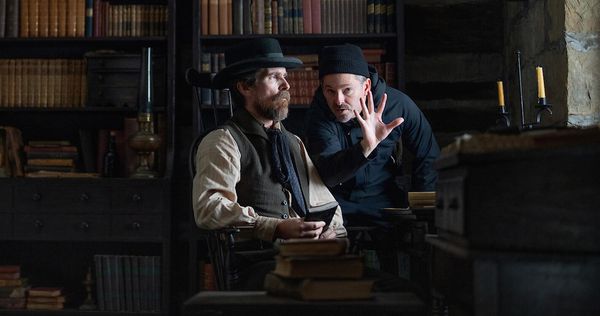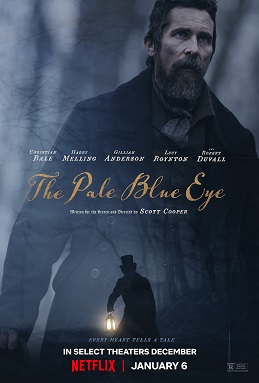Eye For Film >> Movies >> The Pale Blue Eye (2022) Film Review
The Pale Blue Eye
Reviewed by: Jennie Kermode

Although today he is primarily associated with horror, Edgar Allan Poe was, in his time, probably most influential as the originator of the detective fiction genre. He has featured as a character in any number of literary and cinematic works, and this is one of those which allows him to exercise his talents as a sleuth, despite portraying him during his youth. It’s set in West Point Military Academy, where he served as a cadet, and concerns the discovery of a young man hanging by the neck – a man whose corpse, whilst subsequently being stored in the morgue, has its heart cut out.
Called in to investigate is experienced detective Augustus Landor (Christian Bale), a man whom, we are led to believe, has struggled since the death of his wife three years previously – having also lost contact with his daughter – and has taken to drinking a little too heavily. He handles himself, nonetheless, as he shares a few drinks with the young Poe, whom he immediately identifies as of possible assistance due to his keen observational skills and his slight build, which suggests that the task or ripping out a heart – even with the aid of a knife – would be beyond him. It’s a complicated relationship, however, as each develops reasons to doubt the other, and the investigation leads in unexpected directions.

The story incorporates two of the most obnoxious and damaging clichés which persist in films of this sort, plus another which detective thriller writers routinely use as an example of poor story construction. One might make allowances on account of how Poe himself wrote that the greatest possible form of tragic motivation must be the death of a beautiful young woman, but he probably didn’t imagine that informing one in every 20 tales to reach mass audiences. In addition to this, there are issues with a slow plot which is padded in places in an attempt to distract from the too-obvious conclusion.
A better delaying tactic comes in the form of a romantic subplot between Poe and upper crust local beauty Lea (Lucy Boynton), which suffers from being forced to fit the demands of the plot but is gamely played by the two young actors. In the role of Poe, Harry Melling conjures up an extraordinary resemblance, unusual though the author’s appearance was, with his pronounced hypotelorism (enhanced only a little by make-up). Having him speak in a period-appropriate style when nobody else is doing so perhaps takes things too far, but when hit really matters his face tells us what we need to know, whilst Boynton effectively conveys her character’s longing for an intellectual equal. Viewers will quickly notice that she has the kind of delicate little cough which stands in for serious illness in characters whose feminine elegance directors are unwilling to compromise. This not fated to be a happy union – but then, the real Poe never had much luck.
Besides these performances, three things save the otherwise lumbering production. One is Masonobu Takayangi’s cinematography, which finds an exquisite bleakness in the snow-covered Pennsylvania landscape. The second is Howard Shore’s wonderfully atmospheric score. The third is Christian Bale. This is one of his finest performances for some time, sensitive and intelligent beyond the limitations of the material he has to work with. It’s a delight to watch and makes this film a must-see for admirers of his work.
If you have a particular passion for the Gothic, you may find this film appealing despite its flaws. Its impressive cast also includes Timothy Spall, Toby Jones and Gillian Anderson, the latter playing against type and going to an extreme which only the Gothic can accommodate. If you are drawn to it because of Poe, however, you are likely to get much more out of one of his own adapted works - [16653]The House Of Usher[/film], perhaps, or [12860]The Black Cat[/film] – or, dare I say it, a book.
Reviewed on: 29 May 2023
















